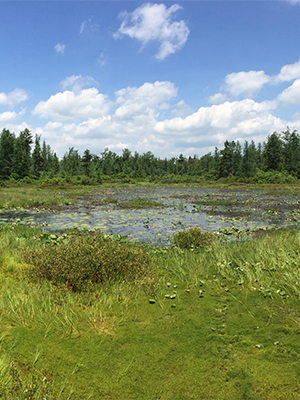Land Conservation
Conservation Easements
A voluntary conservation easement is a legal agreement between a landowner and a land trust or government agency that permanently limits uses of the land in order to protect its conservation values. It allows you to continue to own and use your land, as well as sell it or pass it on to heirs.

When you donate a conservation easement to a land trust, you give up some of the rights associated with the land. For example, you might give up the right to build additional structures, while retaining the right to grow crops. Future owners also will be bound by the easement's terms. The land trust is responsible for ensuring that the easement's terms are followed.
Conservation Easements Offer Great Flexibility
- An easement on property containing rare wildlife habitat might prohibit any development, for example, while one on a farm might allow continued farming and the building of additional agricultural structures.
- An easement may apply to just a portion of the property, and need not require public access.
A landowner sometimes sells a conservation easement, but usually easements are donated. If the donation benefits the public by permanently protecting important conservation resources and meets other federal tax code requirements, it can qualify as a tax-deductible charitable donation. The amount of the donation is the difference between the land's value with the easement and its value without the easement. Placing an easement on your property may or may not result in property tax savings.
Perhaps most important, a conservation easement can be essential for passing land on to the next generation. By removing the land's development potential, the easement lowers its market value, which in turn lowers estate tax. Whether the easement is donated during life or by will, it can make a critical difference in the heirs' ability to keep the land intact.
Frequently Asked Questions about Conservation Easements
(The following information is provided for general information purposes only, and is not intended as legal advice. Most of the information provided in the following FAQs is courtesy of the Land Trust Alliance).
People execute a conservation easement because they love their open space land, and want to protect their land from inappropriate development – while keeping their private ownership of the property. Granting an easement to a conservation organization, like the Western Pennsylvania Conservancy, that qualifies under the Internal Revenue Code as a "public charity" - which nearly all land trusts do - can yield income and estate tax savings. Moreover, land trusts, some of which are more than 100 years old, have the expertise and experience to work with landowners and ensure that the land will remain a permanent open space.
Yes, easements are commonly used in conservation. In the five years between 1998 and 2003, the amount of land protected by local and regional land trusts using easements tripled to five million acres. Landowners have found that conservation easements can be flexible tools, and yet provide a permanent guarantee that the land won't ever be developed. Conservation easements are used to protect all types of land, including coastlines, farm and ranchland, historical or cultural landscapes, scenic views, streams and rivers, trails, wetlands, wildlife areas, and working forests.
An easement restricts development to the degree that is necessary to protect the significant conservation values of that particular property. Sometimes this totally prohibits construction, and sometimes it doesn't. Landowners and land trusts, like the Western Pennsylvania Conservancy, can work together to write conservation easements that reflect both the landowner's desires and the need to protect conservation values. Even the most restrictive easements typically permit landowners to continue such traditional uses of the land as farming and ranching.
Most easements "run with the land," binding the original owner and all subsequent owners to the easement's restrictions. Only gifts of perpetual easements can qualify for income and estate tax benefits. The easement is recorded at the county or town records office so that all future owners and lenders will learn about the restrictions when they obtain title reports.
The land trust is responsible for enforcing the restrictions that the easement document spells out. Therefore, the land trust monitors the property on a regular basis - typically once a year - to determine that the property remains in the condition prescribed by the easement document. The land trust maintains written records of these monitoring visits, which also provide the landowner a chance to keep in touch with the land trust. Many land trusts establish endowments to provide for long-term stewardship of the easements they hold.
There may be income, estate and property tax benefits for donating your land, donating a conservation easement, or selling the property as a "bargain sale" at below market value. The amount and type of tax benefits depends on a variety of factors, including the legal tool you've used to protect your land, the value of the donation, your income level and the total amount of your estate. Again, you should consult with a financial advisor and/or an attorney to fully understand the tax implications.
If you are interested in exploring the possibility of an easement, please contact the Land Protection Department, Western Pennsylvania Conservancy at 412-288-2777 or land@paconserveorg.
This long history of conservation successes is the result of collaboration and a shared vision between the Conservancy and many landowners in the Ligonier Valley. Through the Ligonier Valley Program, we seek to expand protection of the natural features in the valley. By using a variety of conservation techniques, the program will work with the local community to protect and enhance the unique natural character of the Ligonier Valley for generations to enjoy.
For More Information:
Western Pennsylvania Conservancy
Land Conservation Department
800 Waterfront Dr.
Pittsburgh, PA 15222
